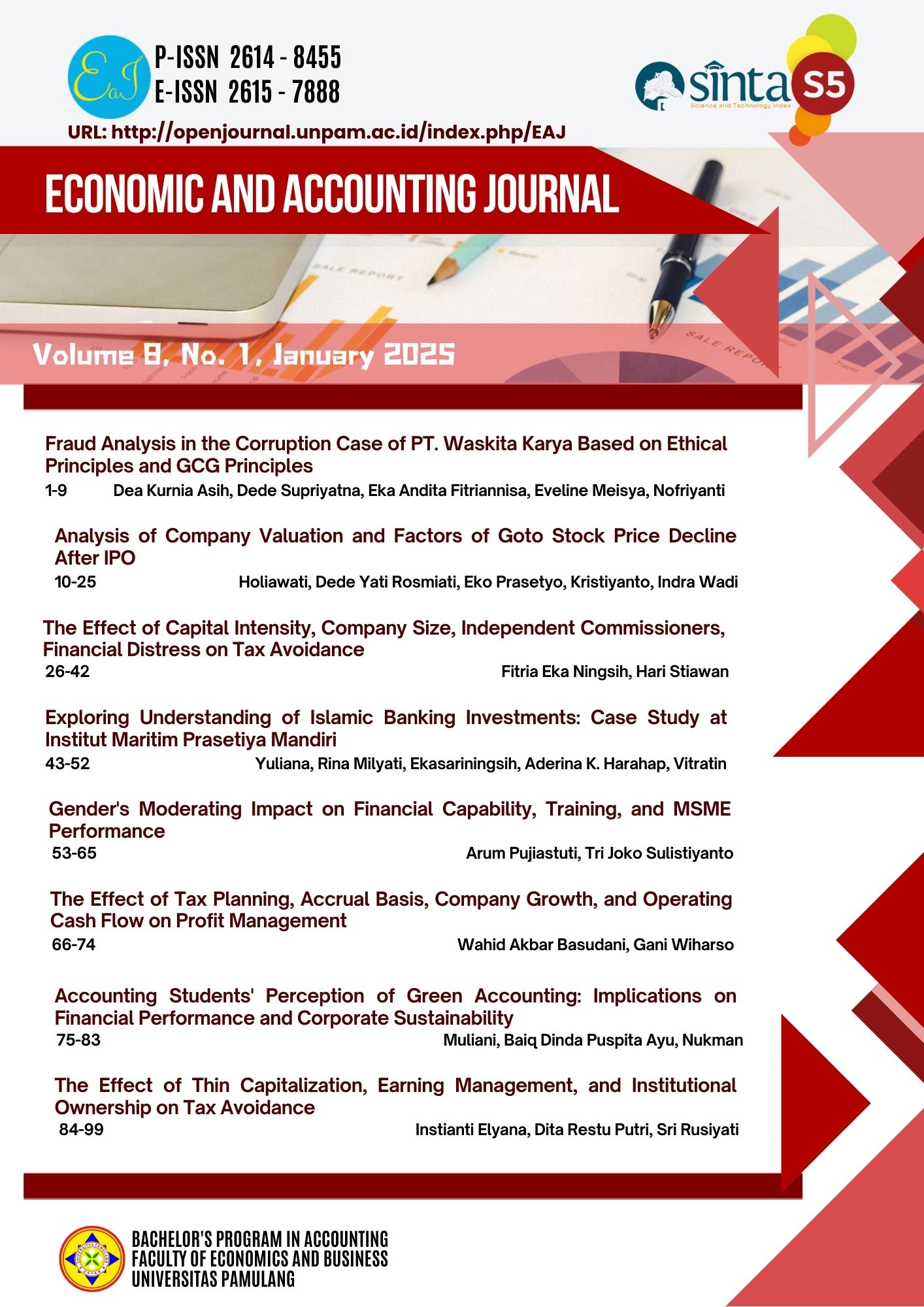The Effect of Tax Planning, Accrual Basis, Company Growth, and Operating Cash Flow on Profit Management
DOI:
https://doi.org/10.32493/eaj.v8i1.y2025.p66-74Keywords:
Earning Management, Tax Planning, Company Growth, operating cash flowAbstract
The objective of this research is to analyze the impact of tax planning, accrual basis, growth, and operating cash flow on earnings management. This research is an associative quantitative research. The data used are in the form of secondary data of the audited financial report and published by each manufacturing company within the consumer goods industry listed on the Indonesia Stock Exchange (IDX) for the period 2015– 2019. The sampling technique in this study uses purposive sampling technique, from the 56 company population determined in the consumer goods industry listed on the Indonesia Stock Exchange obtained a sample of 16 companies for 5 years so that the total sampled is 80 samples. The data analysis in this research uses panel data regression which is processed with the help of the Eviews 9 program. The results of this study indicate that tax planning, accrual basis, growth, and operating cash flow simultaneously affect earnings management. Partially, tax planning has no effect on earnings management. The accrual basis has a positive effect on earnings management. Growth has no effect on earnings management. Operating cash flow has a negative effect on earnings management.
References
Aditama, F., & Purwaningsih, A. (2016). Pengaruh perencanaan pajak terhadap manajemen laba pada perusahaan nonmanufaktur yang terdaftar di Bursa Efek Indonesia.
Amanda, F., & Febrianti, M. (2015). Analisis Pengaruh Beban Pajak Kini, Beban Pajak Tangguhan, dan Basis Akrual Terhadap Manajemen Laba. Ultimaccounting: Jurnal Ilmu Akuntansi, 7(1), 70-86.
Hamzah, A. (2014). Deteksi Manajemen Laba Melalui Beban Pajak Tangguhan, Akrual Dan Arus Kas Operasi (Studi Pada Perusahan Real Estate dan Property yang Terdaftar di Bursa Efek Indonesia). Neo-Bis, 8(1), 19-31.
Hapsari, D. P., & Manzilah, D. (2016). Pengaruh Perencanaan Pajak Terhadap Manajemen Laba Dengan Arus Kas Operasi Sebagai Variabel Kontrol. JAK (Jurnal Akuntansi) Kajian Ilmiah Akuntansi, 3(2).
Hapsoro, D., & Annisa, A. A. (2017). Pengaruh Kualitas Audit, Leverage, Dan Growth Terhadap Praktik Manajemen Laba. Jurnal akuntansi, 5(2), 99-110. https://www.idx.co.id/
Kusuma, D. R. (2016). Dari Rugi Rp 396 M, Antam Untung Rp 11 M di Semester I-2016. Detikfinance. https://finance.detik.com/bursa-dan-valas/d-3287804/dari-rugi-rp-396-m-antam-untung-rp-11-m-di-semester-i-2016
Pratikasari, S. D., Indrayono, Y., & Fadillah, H. (2019). Pengaruh Beban Pajak Tangguhan Dan Akrual Terhadap Manajemen Laba Pada Perusahaan Manufaktur Yang Terdaftar Di Bursa Efek Indonesia Periode 2013-2017. Jurnal Online Mahasiswa (JOM) Bidang Akuntansi, 5(5).
Sibarani, T. J., Hidayat, N., & Surtikanti, S. (2015). Analisis Pengaruh Beban Pajak Tangguhan, Discretionary Accruals, dan Arus Kas Operasi terhadap Manajemen Laba. Jurnal Riset Akuntansi & Perpajakan (JRAP), 2(01), 19-31.
Soda, E. (2016, January 27). PT Timah Diduga Buat Laporan Keuangan Fiktif. Majalan Tambang Online. https://www.tambang.co.id/pt-timah-diduga-membuat-laporan-keuangan-fiktif
Sugiyono. (2018). Metode Penelitian Kuantitatif. Bandung: Alfabeta.
Additional Files
Published
Issue
Section
License
Copyright (c) 2025 Wahid Akbar Basudani, Gani Wiharso

This work is licensed under a Creative Commons Attribution-NonCommercial-ShareAlike 4.0 International License.
Authors who publish with this journal agree to the following terms:
- Authors retain copyright and grant the journal right of first publication with the work simultaneously licensed under a Creative Commons Attribution License that allows others to share the work with an acknowledgement of the work's authorship and initial publication in this journal.
- Authors are able to enter into separate, additional contractual arrangements for the non-exclusive distribution of the journal's published version of the work (e.g., post it to an institutional repository or publish it in a book), with an acknowledgement of its initial publication in this journal.
- Authors are permitted and encouraged to post their work online (e.g., in institutional repositories or on their website) prior to and during the submission process, as it can lead to productive exchanges, as well as earlier and greater citation of published work (See The Effect of Open Access).

This work is licensed under a Creative Commons Attribution-ShareAlike 4.0 International License.


